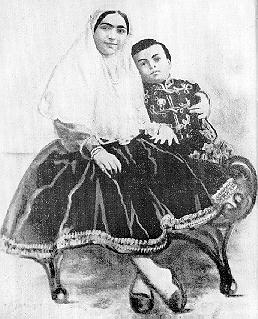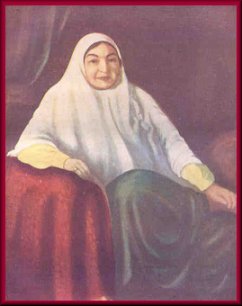 My
mother was herself a genuine mystic in the Muslim tradition (as were most
of her closest companions); and she habitually spent a great deal of time
in prayer for spiritual enlightenment and for union with God. In such a
spirit there was no room for bigotry. Like many other mystics my mother
had a profound poetic understanding. I have, in something near ecstasy,
heard her read perhaps some verses by Roumi or Hafiz, with their exquisite
analogies between man's beatific vision of the Divine and the temporal
beauty and colours of flowers, the music and magic of the night, and the
transient splendors of the Persian dawn.
My
mother was herself a genuine mystic in the Muslim tradition (as were most
of her closest companions); and she habitually spent a great deal of time
in prayer for spiritual enlightenment and for union with God. In such a
spirit there was no room for bigotry. Like many other mystics my mother
had a profound poetic understanding. I have, in something near ecstasy,
heard her read perhaps some verses by Roumi or Hafiz, with their exquisite
analogies between man's beatific vision of the Divine and the temporal
beauty and colours of flowers, the music and magic of the night, and the
transient splendors of the Persian dawn.
The home in which I was brought up was a literary one. I have referred
to my mother’s poetic sense. She was deeply versed in Persian and Arabic
literature, as were several of her ladies-in-waiting and closest women
friends. My mother knew a great deal of poetry by heart and she had a flair
for the appropriate classical quotation - a flair which, I may say, she
never lost throughout her long life. Even when she was nearly ninety she
was never at a loss for the right and apt quotation, not merely from one
of the great poets such as Hafiz and Firdausi or Roumi but from many a
minor or little known writer.
One little anecdote may explain it. Shortly before she died a cousin
of mine quoted one night at dinner a verse of Persian poetry which is rarely
heard. In order not to bother my mother or worry her, I attributed it to
Hafiz. Not at all, said my mother, that is not by Hafiz, and she gave the
name of the poem and the name of the rather obscure poet who had written
it.
A consequence of this characteristic was that mealtimes at my mother's
table were no occasions of idle gossip or title-tattle. Our conversation
was of literature, or poetry; or perhaps one of the elderly ladies who
traveled to and from Tehran a great deal would talk about her experiences
at the Court of the Shah.
My work in the international field, and its crown and climax in my year
as President of the League, had especially delighted my beloved mother.
When I first went to Geneva she was over eighty, and she followed my work
there with unflagging interest. Each year that I went to India we talked
together as fully and as frankly about this as we had, throughout my life,
shared our interests, our joys and our sorrows. For a very long time she
retained her health, all her faculties, her keen zest for life and all
its concerns, whether public and political or family and domestic. When
the 1937 session of the Assembly ended, I went to my home in the South
of France, with no reason to believe that my mother’s health - she was
by then in her eighty-eighth year - was causing any serious anxiety. Nor
indeed was it for she was maintaining her accustomed tranquil and happy
way of life.
 She
had seen both my sons, Aly and Sadruddin, the latter of whom, as a little
boy, was a special joy and comfort to her, both when she came to Europe
and during a summer which he and his mother spent with her in Lebanon.
He bore, too, the name of my elder brother who had died in infancy, and
this particularly rejoiced my mother's heart.
She
had seen both my sons, Aly and Sadruddin, the latter of whom, as a little
boy, was a special joy and comfort to her, both when she came to Europe
and during a summer which he and his mother spent with her in Lebanon.
He bore, too, the name of my elder brother who had died in infancy, and
this particularly rejoiced my mother's heart.
She did not see her great-grand-children, Aly's two boys, Karim and
Amyn, but she knew all about them and she chose both their names, the younger
bearing that of her brother who died as a young man in the 1880’s. She
had, as I have recorded, been present at my first Jubilee, and had been
made especially happy by the congratulatory telegram sent by Lord Wigram,
on behalf of King George V, just before the news of the King's death cut
short our celebrations. Eager, affectionate, pious, alert to every new
happening and new interest, my mother in her last years was someone who
radiated a sense of joy and goodness among all who knew her.
It was at the end of 1937 that I had a cable from India saying that
she had been taken seriously ill and bidding me hasten to come to see her.
I flew to India at once, in the fastest aircraft of those times, which
took three and a half days to reach Bombay.
All her life my mother had retained the habit of a Turkish bath. In
each of our houses in India we had a regularly equipped Turkish bath, with
dry, properly heated alcoves, the correct water system, and as its climax,
a hot pool and a small and very cold pool. My mother had a regular bath
once a week, with all its traditional accompaniments of Turkish and Persian
massage; she had a manicure and a pedicure, and in the Eastern fashion
she had her hair dyed with henna. Coming from her bath one day in November
she had a stroke; she recovered consciousness but thereafter her mental
faculties were impaired and her memory was gone, except for brief periods
of clarity and vision.
She was at our house at Malabar Hill. Her doctor incidentally a descendant
of one of my grandfather’s original followers from Iran who had become
a member of the Indian Medical Service - warned me that I must expect to
find a great change in her. I was surprised to find that her physical health
seemed excellent, but the mental breakdown except for the moments of lucidity
which I have just mentioned - was almost complete. I spent most of my time
with her; and it was a great joy when occasionally she fully recognized
me and talked to me.
All her long life my mother had been animated by one simple, sincere
desire: that when the time came, she should die and be buried on Muslim
soil, by which she meant a land ruled by a free, independent and sovereign
Muslim government. To this was knit one more longing: that in death she
should lie beside my father, whom she had dearly and deeply loved, and
for whom her mourning from the moment of his death more than fifty years
before had been as profound, as durable and as touching as Queen Victoria's
for her beloved Prince Albert.
As soon as I could, therefore, I made preparations to have my mother
taken to Iraq, where an independent Muslim government ruled, and where
my father's body rested at Nejef near Kerbela. There were, obviously considerable
difficulties and problems about her journey thither. Medical advice ruled
out air travel though I have always believed that my mother, in spite of
the various stops that the two-day journey to Baghdad would have involved,
would have stood it better than the sea trip. However, it was by boat that
she went to Basra and thence by train to Baghdad. I had been to Cairo in
the meantime, and I flew back to Baghdad to find her at the house of a
cousin of mine, Aga Mustafa Khan, close by the holy shrine of Kadhamin.
A few minutes after I reached her bedside, her eyes opened, and she
recognized me. Then in the way that all true Muslims would ask, who seek
to follow the Prophet’s example and attain a safe and quiet journey from
the midst of the living, she achieved peace and happiness and that final
“Companionship on High” for which all yearn. In accordance with Ismaili
tradition I did not accompany her body to its last resting place, but certain
nephews and cousins laid her lovingly beside my father, and they were -
as she had long and ardently desired - finally reunited.
Aga
Khan III Mowlana Sultan Mahomed Shah
My
Beloved Grandfather
His
Ideas
Message
to the World of Islam
His Life
His
Mother
His
Wife
His
Brother
His Sons
If
I Were Dictator
Speeches
Memoirs
Achievements
| Home | Guestbook
| Email | Page 1 | Page 2 | Page 3 | Children's Page
| Contents |
Search | What's New |

 My
mother was herself a genuine mystic in the Muslim tradition (as were most
of her closest companions); and she habitually spent a great deal of time
in prayer for spiritual enlightenment and for union with God. In such a
spirit there was no room for bigotry. Like many other mystics my mother
had a profound poetic understanding. I have, in something near ecstasy,
heard her read perhaps some verses by Roumi or Hafiz, with their exquisite
analogies between man's beatific vision of the Divine and the temporal
beauty and colours of flowers, the music and magic of the night, and the
transient splendors of the Persian dawn.
My
mother was herself a genuine mystic in the Muslim tradition (as were most
of her closest companions); and she habitually spent a great deal of time
in prayer for spiritual enlightenment and for union with God. In such a
spirit there was no room for bigotry. Like many other mystics my mother
had a profound poetic understanding. I have, in something near ecstasy,
heard her read perhaps some verses by Roumi or Hafiz, with their exquisite
analogies between man's beatific vision of the Divine and the temporal
beauty and colours of flowers, the music and magic of the night, and the
transient splendors of the Persian dawn.
 She
had seen both my sons, Aly and Sadruddin, the latter of whom, as a little
boy, was a special joy and comfort to her, both when she came to Europe
and during a summer which he and his mother spent with her in Lebanon.
He bore, too, the name of my elder brother who had died in infancy, and
this particularly rejoiced my mother's heart.
She
had seen both my sons, Aly and Sadruddin, the latter of whom, as a little
boy, was a special joy and comfort to her, both when she came to Europe
and during a summer which he and his mother spent with her in Lebanon.
He bore, too, the name of my elder brother who had died in infancy, and
this particularly rejoiced my mother's heart.
